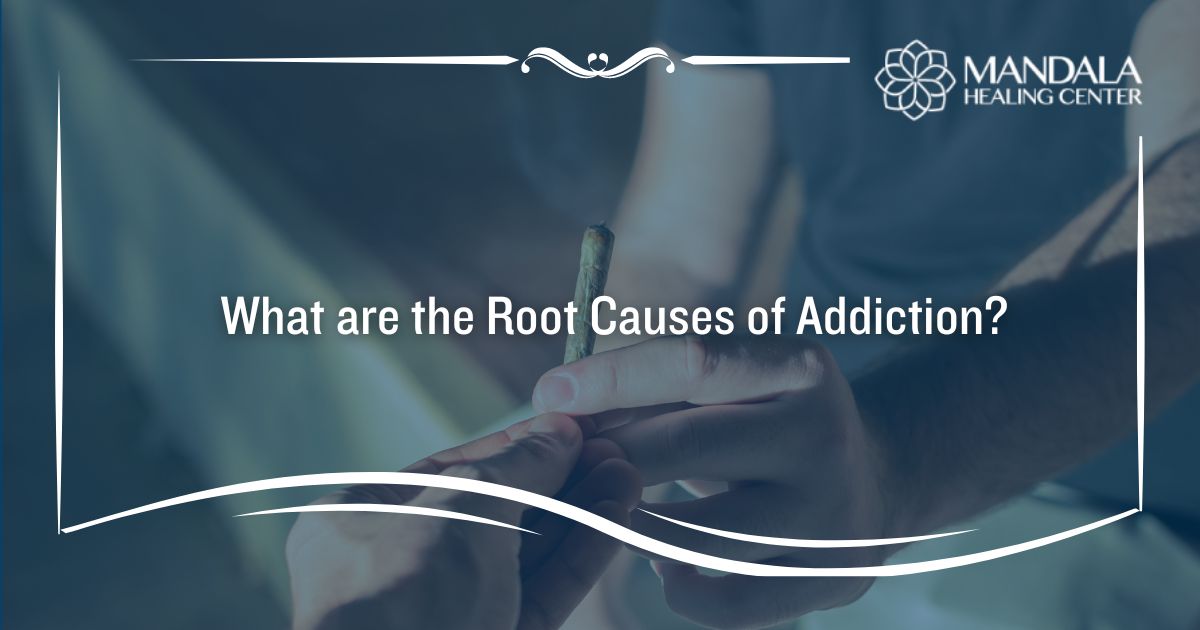Addiction is a chronic and progressive disease that has many underlying causes. The factors that lead you to develop an addiction are known as “root causes.”
During addiction treatment, you will participate in therapy sessions that help you pinpoint experiences in your life that caused your substance abuse. You might find that you have a family history of addiction, dealt with environmental factors like substance abuse in the home, underwent childhood trauma, or have an underlying mental health condition that led to self-medication.
No matter what led to the development of your addiction, you must address it before you can move on in your recovery journey. Identifying the root causes of your addiction is only the first step in healing.
In this article, you will learn:
- What are the signs of a substance use disorder
- What are the root causes of addiction
- How each underlying factor can lead to addiction
What are the Signs of Addiction?
Having an alcohol or drug addiction means your brain and body are dependent on the substance. You will experience irresistible cravings to abuse drugs or alcohol and suffer from withdrawal symptoms when you cannot use it.
The signs and symptoms of a substance use disorder include:
- Behavioral signs – secretive behavior, poor performance in school or work, withdrawing and isolating, trying but failing to stop using a substance, and continuing to abuse a substance despite facing negative consequences.
- Psychological signs – mood swings, increased temper, paranoia, defensiveness, memory issues, poor self-esteem, feelings of hopelessness, and worsening symptoms of mental illness.
- Physical signs – lack of hygiene, changes in sleeping patterns, bloodshot eyes, appearing sick often, losing or gaining a significant amount of weight, and experiencing withdrawal symptoms.
If you are addicted to drugs or alcohol, it’s time to seek help from a drug rehab program. Addiction treatment programs like Mandala Healing Center offer individualized treatment plans to ensure you get the help you need based on your specific situation.
What are the Underlying Causes of Addiction?
There are numerous underlying causes associated with addiction. These include:
Genetic Predisposition
One of the biggest underlying causes of addiction is having a family history of substance abuse. If your parents or grandparents struggled with a substance use disorder, you are more likely to develop one. Research has shown that 50 to 70% of your risk of experiencing addiction is genetic.[1]
Childhood Trauma and Abuse
Many people who go on to experience addiction have a history of childhood trauma or abuse. Your brain does not develop correctly when you experience something traumatic as a child. You will be more prone to seeking comfort in unhealthy ways, such as through drugs or alcohol.
A study found that out of the adolescents seeking treatment for substance abuse, more than 70% of them had a history of childhood trauma.[2]
Social Factors
If your friends abuse drugs and alcohol, you become more likely to develop an addiction. For example, peer pressure can be a huge underlying factor in the development of a substance use disorder. When you have people you care about or look up to constantly telling you to do something, you are more likely to engage in the behavior.
At least 21% of teens have admitted to using drugs or alcohol due to peer pressure.[3]
Early Use
The earlier you begin drinking or using drugs, the more likely you are to experience addiction. When you abuse substances as a young person, your brain is not fully developed. Because your prefrontal cortex is not done forming in your teen years, you are more prone to risk-taking behaviors, impulsivity, and addiction.[4]
Mental Health
If you have an underlying mental health disorder, you are more susceptible to experiencing addiction when you use drugs or alcohol. Some mental illnesses like bipolar disorder increase your impulsivity, which means you might not consider the risks of abusing drugs. On the other hand, you might begin abusing substances to self-medicate your symptoms.
When you have a mental health condition and an addiction, this is known as having co-occurring disorders. According to the Substance Abuse and Mental Health Services Administration (SAMHSA), 21.5 million people struggle with co-occurring disorders.[5]
Lack of Support
Lastly, if you do not have a community of support to rely on, you could develop an addiction. To explain, if you do not have family members or close friends to go to with your problems, you might rely on drugs or alcohol to cope. Additionally, not having support will make it more likely that your substance use disorder becomes severe before you seek help.
Find Help for Substance Abuse and Addiction
If you or a loved one suffers from addiction, it’s time to seek professional help. Whether you are dual diagnosis or simply have a genetic predisposition to addiction, the Mandala Healing Center is here to help. We offer evidence-based behavioral therapies to address addictive behaviors and provide you with important coping mechanisms.
Contact us today for more information on our drug and alcohol rehab program.
References:
- Rutgers: Rutgers Researchers Delve Deep Into the Genetics of Addiction
- Wiley Online Library: Substance use, childhood traumatic experience, and Post-traumatic Stress Disorder in an urban civilian population
- The National Council for Wellbeing: Peer Pressure with Substance Abuse
- Learn Genetics Utah: The Adolescent Brain
- The Substance Abuse and Mental Health Services Administration (SAMHSA): Co-Occurring Disorders and Other Health Conditions












